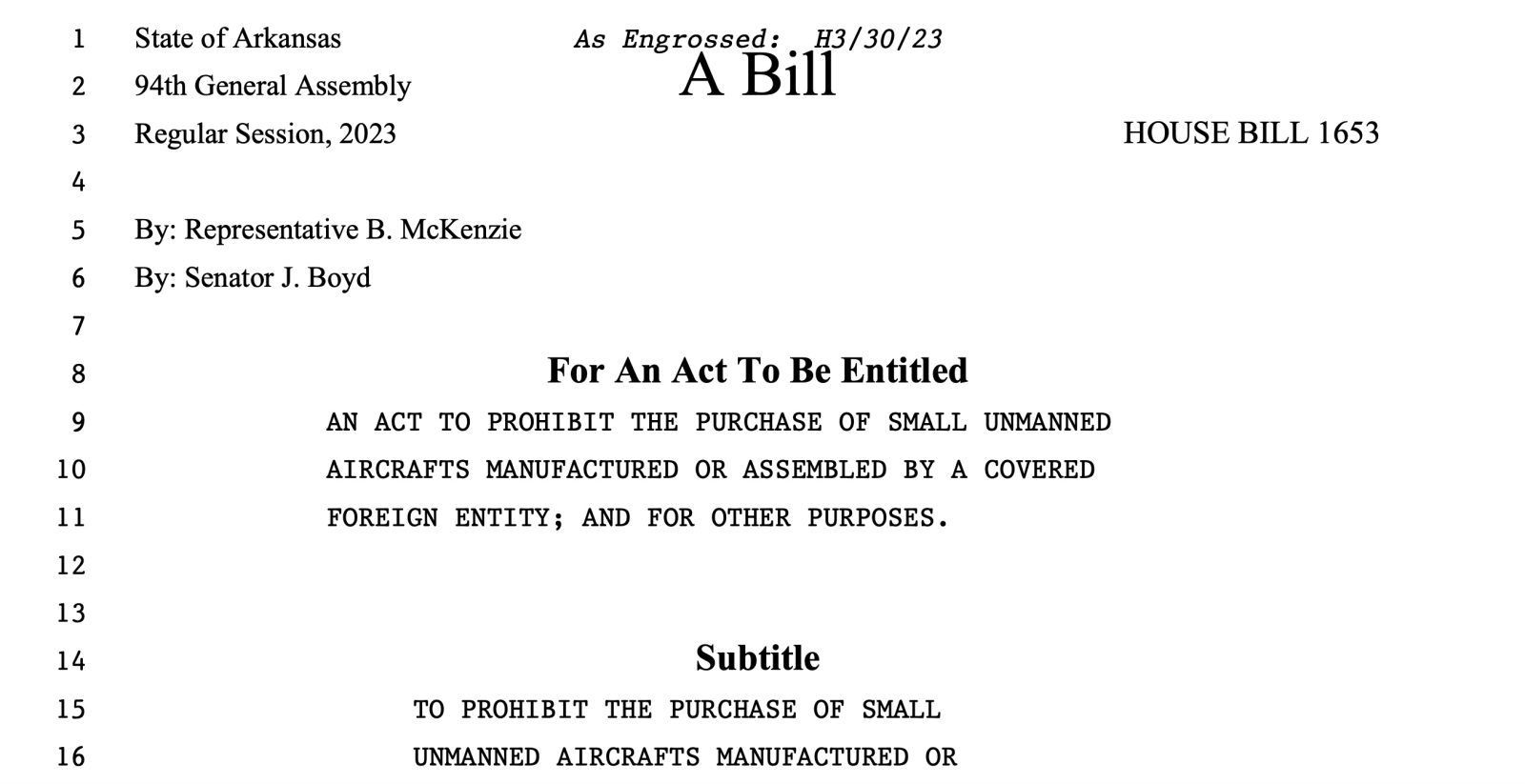
Legislators in Arkansas have joined a still small but powerful and gradually expanding cohort of officials in the US moving to formally ban use of drones made in China for official purposes – a blacklisting movement that first became popular among politicians in Washington targeting sector powerhouse DJI.
Arkansas Act 525 bans the procurement and operation of drones made by companies in China or other countries that have been added to official US blacklists. It stipulates that UAVs from “covered foreign entities” proscribed from use by various US federal agencies may not be bought by the State of Arkansas any of its divisions or organizations – including police and firefighting forces.
The Arkansas law gives current operators of banned drones until 2027 to ditch the now-prohibited craft unless they receive a waiver from the state’s Department of Transport to continue using them.
Adoption of Arkansas’s legislation was motivated by the same accusations that accompanied earlier federal blacklists of DJI drones, including claims data collected by the company’s UAVs is being leaked back to Chinese Communist Party services for nefarious use.
Because the Arkansas law piggybacks on those federal entities scrolls, its sponsors essentially parroted the same unsubstantiated allegations against DJI that have been used to justify blacklisting in Washington.
Read: New US bill seeks far broader ban on DJI drone use
In comments given to the Arkansas Democrat Gazette Monday, the law’s co-sponsor, Republican House member Brit McKenzie, called its passage “a commonsense measure to protect our state agencies, to protect our local departments.”
In describing just what the legislation was shielding those organizations from, McKenzie used even stronger language than usually heard in Washington to rationalize DJI blacklisting – but did replicate the national discourse by failing to substantiate his condemnation in any way.
“It’s an extraordinarily bad actor,” McKenzie told the local paper of DJI. “It’s a Chinese military company. We can call it 16 things under the sun, (but) that’s really what it is.”
Read: Blacklisting redux: GOP legislators targeting DJI anew
Also typical of US Congress members when they elaborate their reasons for targeting DJI, McKenzie eventually tipped his hand with comments suggesting the prohibition at least partly aims to handicap DJI’s US and global leadership in drone sales, and thereby aid American rivals.
“Why are they still so cheap?” he asked. “I have to think that that’s by design or intention so that agencies or groups of people… buy them.”
After failing to explain why that universally practiced goal of goods manufacturers is only bad when applied by DJI, McKenzie then further strengthened the impression protectionism is behind the initiative with the unsolicited urging that, um, protectionism is in no way involved.
“That’s the great part about the bill,” McKenzie continued, at times in a muddle. “It’s not mandating American-made purchases, it’s just saying that companies – any drones manufactured similar to China or Russia – you cannot have future (drones). It’s not a protectionist bill. It’s a safety bill.”
DJI, for its part, again denied the allegations it has ties to or works for the Chinese government, and described its products as designed for and valuable to both consumer and enterprise clients.
Read: After product ban, the US DoD formally blacklists drone giant DJI [Update]
News of the Arkansas bill’s passage appears to have been slow in coming – prompted, it appears, by the Democrat Gazette story yesterday. Indeed the last major evolution of the text appears to have occurred April 5, when it was “ordered transmitted to the Governor’s Office.”
That, ironically, was the same day a new law in Florida went into force banning government agencies from using drones originating from a “foreign country of concern.” As DroneDJ’s Seth Kurkowski noted in reporting that ban, Florida’s “police agencies are not happy about” that preventing their continued deployment of their DJI drone fleets.
Law enforcement units in Arkansas don’t seem any more elated about losing their DJI drones to the state’s blacklisting – though that irritation seems to be common amid the widening prohibitions. So, too, is another aspect of Little Rock’s version of that DJI ban: the lack of accompanying funding increases required to finance payment for generally more expensive domestic replacements.
May 3 Update
Just hours after DroneDJ published the above post, officials in Alabama joined the growing crowd wielding legislation to ban state agencies from buying or using drones made from companies in China.
Alabama representative James Lomax tabled a bill that would prohibit state administrations from purchasing UAVs produced by Chinese companies on the federal Office of Foreign Asset Control’s Specially Designated Nationals and Blocked Persons List. The reason behind the state-wide ban: Lomax’s concern that suspect UAVs might spy on the US Army’s Redstone Arsenal located in his hometown of Huntsville. And what’s good for Huntsville has to be right for the entire state.
As that happened, lawmakers in Florida moved to address the financial realities of their ban last month on Chinese made drones. In order permit state agencies to obtain alternative UAV technologies to replace now-banned DJI favorites, Florida legislators are assigning $25 million in procurement funding.
That support will come from taxpayers – who presumably won’t be any happier about that blacklisting consequence than Florida or Arkansas police forces are.
FTC: We use income earning auto affiliate links. More.


Comments